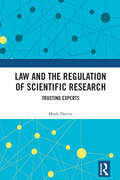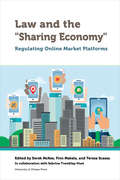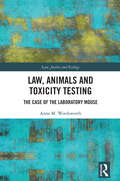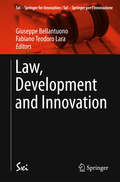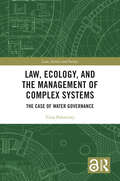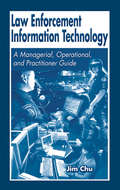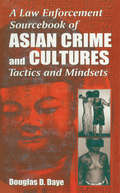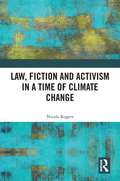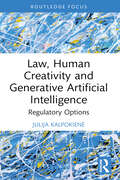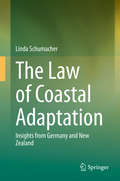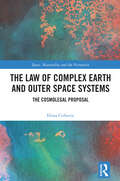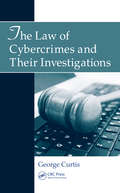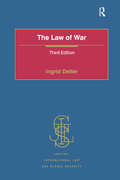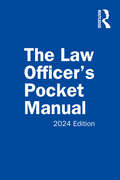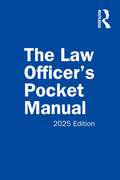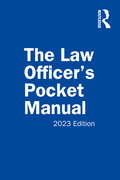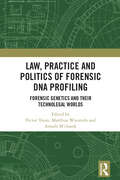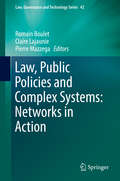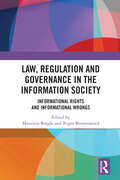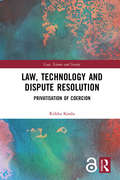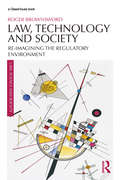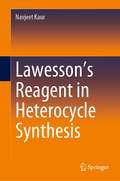- Table View
- List View
Law and the Regulation of Scientific Research: Trusting Experts
by Mark DaviesScientific research is fundamental to addressing issues of great importance to the development of human knowledge. Scientific research fuels advances in medicine, technology and other areas important to society and has to be credible, trustworthy and able to command confidence in the face of inevitable uncertainties. Scientific researchers must be trusted and respected when they engage with knowledge acquisition and dissemination and as ethical guardians in their education and training roles of future generations of researchers. The core values of scientific research transcend disciplinary and national boundaries and approaches to the organisation and oversight of research systems can impact significantly upon the ethics and conduct of researchers. This book draws upon legal expertise to critically analyse issues of regulation, conduct and ethics at the important interface between scientific research and regulatory and legal environments. In so doing it aims to contribute important additional perspectives to the existing literature. Case studies are engaged with to assist with the critical analysis of the current position and the consideration of future possibilities. The book will be of interest to academics in the fields of science, law and policy; science and law students and scientific researchers at more advanced stages of their careers. Research professionals in government and the private sector and legal practitioners with interests in the regulation of research should also find the work of interest.
Law and the "Sharing Economy": Regulating Online Market Platforms (Law, Technology and Media)
by Harry Arthurs Francesco Ducci Marie-Cécile Escande-Varniol Vincent Gautrais Michael Geist Eran Kaplinsky Nofar Sheffi Sabrina Tremblay-Huet Eric Tucker Mariana ValverdeControversy shrouds sharing economy platforms. It stems partially from the platforms’ economic impact, which is felt most acutely in certain sectors: Uber drivers compete with taxi drivers; Airbnb hosts compete with hotels. Other consequences lie elsewhere: Uber is associated with a trend toward low-paying, precarious work, whereas Airbnb is accused of exacerbating real estate speculation and raising the cost of long-term rental housing. While governments in some jurisdictions have attempted to rein in the platforms, technology has enabled such companies to bypass conventional regulatory categories, generating accusations of “unfair competition” as well as debates about the merits of existing regulatory regimes. Indeed, the platforms blur a number of familiar distinctions, including personal versus commercial activity; infrastructure versus content; contractual autonomy versus hierarchical control. These ambiguities can stymie legal regimes that rely on these distinctions as organizing principles, including those relating to labour, competition, tax, insurance, information, the prohibition of discrimination, as well as specialized sectoral regulation. This book is organized around five themes: technologies of regulation; regulating technology; the sites of regulation (local to global); regulating markets; and regulating labour. Together, the chapters offer a rich variety of insights on the regulation of the sharing economy, both in terms of the traditional areas of law they bring to bear, and the theoretical perspectives that inform their analysis. Published in English.
Law and the Technologies of the Twenty-First Century
by Roger Brownsword Morag GoodwinLaw and the Technologies of the Twenty-First Century provides a contextual account of the way in which law functions in a broader regulatory environment across different jurisdictions. It identifies and clearly structures the four key challenges that technology poses to regulatory efforts, distinguishing between technology as a regulatory target and tool, and guiding the reader through an emerging field that is subject to rapid change. By extensive use of examples and extracts from the texts and materials that form and shape the scholarly and public debates over technology regulation, it presents complex material in a stimulating and engaging manner. Co-authored by a leading scholar in the field with a scholar new to the area, it combines comprehensive knowledge of the field with a fresh approach. This is essential reading for students of law and technology, risk regulation, policy studies, and science and technology studies.
Law, Animals and Toxicity Testing: The Case of the Laboratory Mouse (ISSN)
by Anne M. WordsworthDrawing on our growing knowledge of animal cognition, this book provides a critical analysis of the use of animals in the legal regime and the practice of toxicity testing.Although animal abuse has become a major issue, animal testing remains largely in the shadows, even though it involves substantial cruelty. Toxicity testing, in particular, imposes considerable pain, suffering and ultimately death on those laboratory animals – often mice – chosen to demonstrate the characteristics of chemicals and their commercial potential. This book documents and critically analyzes the animal protection laws of the European Union, the United States and Canada. It not only examines the tests themselves and the suffering they inflict on animals but also exposes the failure of both the testing and the toxicity laws to effectively protect human health and the environment. Finally, the book takes up the potential of alternative non-animal testing methods to replace the current regimen and to reduce current damage to health and the environment.This book will be of interest to scholars and researchers in the fields of animal studies, environmental law and sociolegal studies, as well as activists and others with an interest in ethics and animal rights.
Law, Development and Innovation
by Giuseppe Bellantuono Fabiano Teodoro LaraThis book deals with one strand of the intense debate concerning the links between law and development, namely the coordination of innovation processes and legal change. It analyzes how innovation, and ultimately development, can be fostered or hindered by existing or new legal infrastructures. The book includes eleven original contributions from senior and junior scholars and is divided into two parts, the first focusing on theoretical frameworks and the second presenting several case studies on various institutional aspects. A particular strength of this part is its broad geographical coverage, which encompasses the legal frameworks in Europe, the Americas, Africa, and Asia. The contributions collected in this book will be of value to a broad readership. Academic scholars will find useful information on lessons learned from reforms implemented in different areas and come to better understand the methodological hurdles involved in reform assessment. Policymakers in national and international organizations can draw on these studies when designing new programs. Lastly, practitioners in developed and developing countries can use these contributions to promote the success of current or new initiatives.
Law, Ecology, and the Management of Complex Systems: The Case of Water Governance (Law, Science and Society)
by Tiina PaloniittyThis book addresses the role of law in the adaptive management of socioecological systems. Recent years have witnessed a rise in discussion over the relation between adaptivity and law; as if after decades of insouciance, legal scholars have finally started to understand the impacts of the scientific paradigm called adaptive management to the legal sphere. Even though the complicated relations between law and the adaptive management of socioecological systems have become more debated, a thorough examination of the scientific and theoretical fundamentals of such endeavours has yet to be presented. Using the illustrative example of European Union water governance and its path towards embracing adaptive management, this book emphasises the legal significance of properly understanding the manner in which scientific knowledge of the environment is produced. Though always pivotal, rigorously apprehending science is especially crucial when dealing with the management of complex ecosystems as the ‘normative’ is created gradually before law begins to examine the ‘facts’ of the matter. After examining the roots of adaptive management, this book argues that the legal needs to understand itself as an integral part of the process of the socioecological management of complex systems, and not merely an external umpire resolving disputes. As whole the book offers new insights into the Union regulator’s approaches to scientific realities, making it an interesting read not only to academics and legal scholars but also to regulators striving to deepen their understanding or pondering which approach to adopt in the face of new regulatory challenges, and to scientists interested in the science and law aspects of their work.
Law Enforcement Information Technology: A Managerial, Operational, and Practitioner Guide
by James ChuARE YOU PREPARED FOR THE LAW ENFORCEMENT IT REVOLUTION? Law enforcement agencies that are laggards in Information Technology (IT) will soon, if not already, be considered mismanaged. Whether you are in an operational position, or you are a police officer who aspires to a higher rank, you must be aware of how IT can help you perform your job and hel
A Law Enforcement Sourcebook of Asian Crime and CulturesTactics and Mindsets
by Douglas D. DayeEven in multicultural North America, few whites, blacks, or Hispanics have extensive experience or understanding of Asian culture. For experienced police officers, intelligence analysts, correctional officers, and prosecutors, the problems of cultural differences in behavior remain complex and problematic. This book addresses these specific law enforcement problems, and supplies law enforcement professionals with information and strategies for easier arrests, more accurate intelligence, more successful prosecutions, and fewer problems during incarceration.
Law, Fiction and Activism in a Time of Climate Change
by Nicole RogersThe book examines the narratives of climate change which have developed and which are currently evolving in three areas: law, fiction and activism. Narratives of climate change generated by litigants, judges, writers of fiction and activists are having, and will have, a profound effect on the way we respond to the climate change crisis. Acknowledging the prevalence of unreliable narrators, this book explores the reliability and significance of different forms of climate narrative. The author analyses overlapping themes and points of intersection, considering the recurrent motif of the trickster, the prominence of the child, the significance and ongoing viability of the rights discourse, and the increasingly prevalent emergency framing with its multiple implications for law’s empire. She asks how law, fiction and activism measure up as textual and performative fora for telling the story of climate change and anticipating a climate-changed future. And, in addition, how can they help foster transformative narratives which empower us to confront the climate change crisis? This highly topical, cross-disciplinary work will be of interest to anyone concerned about the growing climate emergency and makes a valuable contribution to climate law, environmental law, the environmental humanities and ecocriticism.
Law, Human Creativity and Generative Artificial Intelligence: Regulatory Options
by Julija KalpokienėThis book addresses the complex issue of human creativity in the age of Artificial Intelligence.Artificial intelligence (AI) is increasingly being used to create texts, images, and musical compositions. This increase in the application of AI within the creative industries can of course enhance human performance while producing creative and commercial challenges for human authors. Against this background, this book considers how current mechanisms for incentivising creativity – including legal regulations, such as copyright, state funding and tax regimes – are inadequate in the age of AI. Acknowledging the opportunity that AI presents, the book then proposes alternative regulatory mechanisms through which human creativity can be incentivised.This book will appeal to scholars and researchers in the areas of socio-legal studies, intellectual property law, media law, and law and technology.
The Law of Coastal Adaptation: Insights from Germany and New Zealand
by Linda SchumacherThis work investigates law as an instrument to deal with the challenges of sea level rise. As the two countries chosen as examples differ significantly in their adaptation strategies and the corresponding legal regulations, the author presents general ideas on how any legal framework facing similar challenges could be improved. In particular, (flood) risk assessments, coastal defences and flood-resistant design as well as spatial and land use planning are discussed, including managed retreat. Moreover, conflicts as well as potential synergies of coastal adaptation and nature conservation are examined.Due to the thorough analysis this book is not just an essential read for policymakers and researchers interested in the coastal area but climate change adaptation in general as many general findings are transferrable to other impacts.
The Law of Complex Earth and Outer Space Systems: The Cosmolegal Proposal (Space, Materiality and the Normative)
by Elena CirkovicThis book offers a paradigm-shifting exploration of lawmaking for the complex interactions between Earth systems and outer space. Drawing on complex systems science, posthuman approaches, and plural ontologies, the author proposes a reimagining of law and governance for the cosmic age. Through the “cosmolegal” perspective, this study embraces the inherent uncertainties and complexities of Earth-space interactions. From Arctic methane craters to orbital debris, the book weaves together scientific insights, landscape architecture, legal theory, and doctrine to address pressing environmental challenges that span Earth and beyond.While legal scholarship has increasingly engaged with Earth System Science, it typically treats outer space as distinct from Earth’s environment. However, Earth’s existence and complex systems are fundamentally intertwined with and emerge from outer space. This book argues that a legal framework for Earth’s systems needs to include outer space.At its core, the book advocates for a “complexification” of law, calling for greater epistemic humility in legal thought and practice. Thoughtful and provocative, this work invites readers to reconsider fundamental assumptions about law, nature, and agency beyond the human in an era of planetary change. The cosmolegal approach aims to shift legal imagination and understanding, positioning human law as just one of many actors within the cosmos.This original work will appeal to scholars of legal theory and environmental law, as well as those interested in posthumanism, ecology, and materialism.
The Law of Cybercrimes and Their Investigations
by George CurtisCybercrime has become increasingly prevalent in the new millennium as computer-savvy criminals have developed more sophisticated ways to victimize people online and through other digital means. The Law of Cybercrimes and Their Investigations is a comprehensive text exploring the gamut of issues surrounding this growing phenomenon.After an introduct
The Law of Life and Death
by Elizabeth Price FoleyAre you alive? What makes you so sure? Most people believe this question has a clear answer—that some law defines our status as living (or not) for all purposes. But they are dead wrong. In this pioneering study, Elizabeth Price Foley examines the many, and surprisingly ambiguous, legal definitions of what counts as human life and death. Foley reveals that “not being dead” is not necessarily the same as being alive, in the eyes of the law. People, pre-viable fetuses, and post-viable fetuses have different sets of legal rights, which explains the law's seemingly inconsistent approach to stem cell research, in vitro fertilization, frozen embryos, in utero embryos, contraception, abortion, homicide, and wrongful death. In a detailed analysis that is sure to be controversial, Foley shows how the need for more organ transplants and the need to conserve health care resources are exerting steady pressure to expand the legal definition of death. As a result, death is being declared faster than ever before. The "right to die," Foley worries, may be morphing slowly into an obligation to die. Foley’s balanced, accessible chapters explore the most contentious legal issues of our time—including cryogenics, feticide, abortion, physician-assisted suicide, brain death, vegetative and minimally conscious states, informed consent, and advance directives—across constitutional, contract, tort, property, and criminal law. Ultimately, she suggests, the inconsistencies and ambiguities in U.S. laws governing life and death may be culturally, and perhaps even psychologically, necessary for an enormous and diverse country like ours.
The Law of War (Justice, International Law and Global Security)
by Ingrid DetterThe third edition of Ingrid Detter's authoritative work explores the changing legal context of modern warfare in light of events over the last decade. Ingrid Detter reviews the status of non-State actors, as individuals and groups become more prominent in international society. Covering post 9/11 events and the resulting changes in the ethos of war, the author analyses the role of military companies and examines what their legitimacy means for international society. The edition also discusses certain ’intrinsic’ rules in the Law of War, such as rules giving individuals the right to be spared genocide, torture, slavery and apartheid and assure them basic democratic rights. The author questions the right of ’illegal’ combatants to be treated as prisoners of war and suggests that a minimum standard must be afforded to all, whether captured dictators or detainees suspected of terrorism. In the modern world, the individual (the soldier, the civilian, the dictator, the terrorist or the pirate) can no longer behave as they wish. Further new topics include 'target killings', the ’right to protect’ (’R2P’, - claimed to be a new form of intervention), the use of unregulated weapons such as drones and robots, the war scenario in Outer Space and cyber crimes. There is also a discussion of new developments in the field of war crimes including severe criticism of the novel concept 'joint criminal enterprise' (JCE), which, in the opinion of the author, undermines the Rule of Law. This updated and expanded edition will be of use to statesmen, scholars and students of international relations and international law.
The Law Officer's Pocket Manual: 2024 Edition
by John G. Miles Jr. David B. Richardson Anthony E. ScudellariThe Law Officer’s Pocket Manual is a handy, pocket-sized, spiral-bound manual that highlights basic legal rules for quick reference and offers examples showing how those rules are applied. The manual provides concise guidance based on U.S. Supreme Court rulings on constitutional law issues and other legal developments, covering arrest, search, surveillance, and other routine as well as sensitive areas of law enforcement. It includes more than 100 examples drawn from leading cases to provide guidance on how to act in a wide variety of situations. The 2023 edition is completely updated to reflect recent court decisions. This book helps you keep track of everything in a readable and easy-to-carry format. Routledge offers tiered discounts on bulk orders of 5 or more copies: For more information, please visit: https://www.routledge.com/collections/16268
The Law Officer's Pocket Manual: 2025 Edition
by John G. Miles Jr. David B. Richardson Anthony E. ScudellariPrepared by Patrick J. Sobkowski, J.D.The Law Officer’s Pocket Manual is a handy, pocket-sized, spiral-bound manual that highlights basic legal rules for quick reference and offers examples showing how those rules are applied. The manual provides concise guidance based on U.S. Supreme Court rulings on constitutional law issues and other legal developments, covering arrest, search, surveillance, and other routine as well as sensitive areas of law enforcement. It includes more than 100 examples drawn from leading cases to provide guidance on how to act in a wide variety of situations. The 2025 edition is completely updated to reflect recent court decisions. This book helps you keep track of everything in a readable and easy-to-carry format.Routledge offers tiered discounts on bulk orders of 5 or more copies: For more information and to learn about other Books for Law Enforcement Professionals, please visit: https://www.routledge.com/collections/16268
The Law Officer’s Pocket Manual, 2023 Edition
by John G. Miles Jr. David B. Richardson Anthony E. ScudellariThe Law Officer’s Pocket Manual is a handy, pocket-sized, spiral-bound manual that highlights basic legal rules for quick reference and offers examples showing how those rules are applied. The manual provides concise guidance based on U.S. Supreme Court rulings on constitutional law issues and other legal developments, covering arrest, search, surveillance, and other routine as well as sensitive areas of law enforcement. It includes more than 100 examples drawn from leading cases to provide guidance on how to act in a wide variety of situations. The 2023 edition is completely updated to reflect recent court decisions. This book helps you keep track of everything in a readable and easy-to-carry format. Routledge offers tiered discounts on bulk orders of 5 or more copies: For more information, please visit: https://www.routledge.com/collections/16268
Law, Practice and Politics of Forensic DNA Profiling: Forensic Genetics and their Technolegal Worlds
by Victor Toom Matthias Wienroth Amade M’charekThis collection reviews developments in DNA profiling across jurisdictions with a focus on scientific and technological developments as well as their political, ethical, and socio-legal aspects. Written by leading scholars in the fields of social studies of forensic science, science and technology studies and socio-legal studies, the book provides state-of-the-art analyses of forensic DNA practices in a diverse range of jurisdictions, new and emerging forensic genetics technologies and issues of legitimacy. The work articulates the various forms of technolegal politics involved in the everyday, standardised and emerging practices of forensic genetics and engages with the most recent scholarly and policy literature. In analyses of empirical cases, and by taking into account the most recent technolegal developments, the book explores what it means to live in a world that is increasingly governed through anticipatory crime control and its related risk management and bio-surveillance mechanisms, which intervene with and produce political and legal subjectivities through human bodies in their DNA. This volume is an invaluable resource for those working in the areas of social studies of forensic science, science and technology studies, socio-legal studies, sociology, anthropology, ethics, law, politics and international relations.
Law, Public Policies and Complex Systems: Networks in Action (Law, Governance and Technology Series #42)
by Claire Lajaunie Romain Boulet Pierre MazzegaThis book investigates how various scientific communities – e.g. legal scientists, political scientists, sociologists, mathematicians, and computer scientists – study law and public policies, which are portrayed here as complex systems. Today, research on law and public policies is rapidly developing at the international level, relying heavily on modeling that employs innovative methods for concrete implementation. Among the subject matter discussed, law as a network of evolving and interactive norms is now a prominent sphere of study. Similarly, public policies are now a topic in their own right, as policy can no longer be examined as a linear process; rather, its study should reflect the complexity of the networks of actors, norms and resources involved, as well as the uncertainty or weak predictability of their direct or indirect impacts. The book is divided into three maain parts: complexity faced by jurists, complexity in action and public policies, and complexity and networks. The main themes examined concern codification, governance, climate change, normative networks, health, water management, use-related conflicts, legal regime conflicts, and the use of indicators.
Law, Regulation and Governance in the Information Society: Informational Rights and Informational Wrongs
by Maurizio Borghi Roger BrownswordThis edited collection seeks to map the landscape of contemporary informational interests, to evaluate a range of recognised and putative rights and wrongs associated with modern information societies, and to consider how law, regulation, and governance should be deployed in response. New technologies and new applications constantly disrupt our values, our framing of our world, and our sense of where we are and who we are. In our ‘information societies’, we entertain mixed hopes and expectations, as well as significant fears and concerns. At the root of these, there are a number of informational interests, on the basis of which certain rights are claimed and particular wrongs denounced. This book addresses these interests, considering them as relating primarily to the integrity of the informational eco-system, to the accessibility, accuracy, and authenticity of public information, and to our individual ability to control the outward and inward flows of information that relates directly to ourselves. Covering a wide range of subjects, the book’s interrogation of our contemporary information society is oriented around two questions: first, whether the information society in which we live is the kind of society that we think it should be and, second, if not, what we can reasonably expect law, regulation and governance to do in providing the basis for improving it. This book will be of considerable interest to those working at the intersection of law and technology, as well as others concerned with the legal, political, and social aspects of our information society.
Law, Technology and Dispute Resolution: The Privatisation of Coercion (Law, Science and Society)
by Riikka KouluThe use of new information and communication technologies both inside the courts and in private online dispute resolution services is quickly changing everyday conflict management. However, the implications of the increasingly disruptive role of technology in dispute resolution remain largely undiscussed. In this book, assistant professor of law and digitalisation Riikka Koulu examines the multifaceted phenomenon of dispute resolution technology, focusing specifically on private enforcement, which modern technology enables on an unforeseen scale. The increase in private enforcement confounds legal structures and challenges the nation-state’s monopoly on violence. And, in this respect, the author argues that the technology-driven privatisation of enforcement – from direct enforcement of e-commerce platforms to self-executing smart contracts in the blockchain – brings the ethics of law’s coercive nature out into the open. This development constitutes a new, and dangerous, grey area of conflict management, which calls for transparency and public debate on the ethical implications of dispute resolution technology.
Law, Technology and Society: Reimagining the Regulatory Environment (Law, Science and Society)
by Roger BrownswordThis book considers the implications of the regulatory burden being borne increasingly by technological management rather than by rules of law. If crime is controlled, if human health and safety are secured, if the environment is protected, not by rules but by measures of technological management—designed into products, processes, places and so on—what should we make of this transformation? In an era of smart regulatory technologies, how should we understand the ‘regulatory environment’, and the ‘complexion’ of its regulatory signals? How does technological management sit with the Rule of Law and with the traditional ideals of legality, legal coherence, and respect for liberty, human rights and human dignity? What is the future for the rules of criminal law, torts and contract law—are they likely to be rendered redundant? How are human informational interests to be specified and protected? Can traditional rules of law survive not only the emergent use of technological management but also a risk management mentality that pervades the collective engagement with new technologies? Even if technological management is effective, is it acceptable? Are we ready for rule by technology? Undertaking a radical examination of the disruptive effects of technology on the law and the legal mind-set, Roger Brownsword calls for a triple act of re-imagination: first, re-imagining legal rules as one element of a larger regulatory environment of which technological management is also a part; secondly, re-imagining the Rule of Law as a constraint on the arbitrary exercise of power (whether exercised through rules or through technological measures); and, thirdly, re-imagining the future of traditional rules of criminal law, tort law, and contract law.
Law, Tropical Forests and Carbon
by Catherine Mackenzie Rosemary Lyster Constance Mcdermott Rosemary Lyster Catherine MacKenzieEmerging from the scientific parameters underpinning REDD+ (including the measurement of carbon stocks, reporting and verification), Law, Tropical Forests and Carbon considers the crucial challenges for global and national governance and the legal rights and interests of indigenous people and local communities, all of which have fundamental implications for development and poverty alleviation. With contributions from leading experts in the fields of law, governance, science, development studies and geography, it sheds light on the complexity of REDD+ and offers perspectives on the extent to which REDD+ agreements can be enforced under international law and in concert with new private and public domestic institutions.
Lawesson’s Reagent in Heterocycle Synthesis
by Navjeet KaurThis book focuses on the new and old methods for the synthesis of various heterocycles using Lawesson’s reagent. The book covers an important and rapidly growing branch of heterocyclic chemistry and can serve as a guide to those who are completing their education and are about to enter the job market. Students will be able to find all Lawesson’s reagent-assisted protocols for the synthesis of heterocycles in one place. This feature of the book provides an important benefit, because sometimes users want to see all the possibilities and relevant information for making a particular compound using one particular reagent. The purpose of this valuable resource is to provide the knowledge not only to students but also to pharmacologists, biochemists, organic and medicinal chemists, researchers, and academic professionals for easy access to synthetic protocols for different heterocycles using Lawesson’s reagent. The book will be greatly helpful for everyone involved in the field and can pave the way for better understanding and quantification of heterocycle synthesis.
